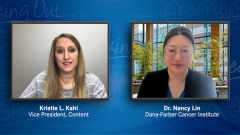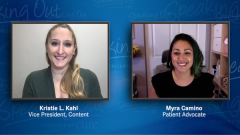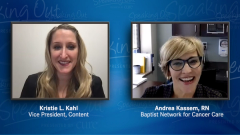
Patient Offers Advice on Advocating for Quality of Life, Second Opinions in Metastatic Breast Cancer
In CURE’s Speaking Out video series, on behalf of Living Beyond Breast Cancer, Myra Camino discusses her experience as a patient advocating for herself after her stage 4 metastatic breast cancer diagnosis.
Kristie L. Kahl: We talk a lot about patients being their own best advocates, but can you explain what that is and what it means to you as a patient?
Myra Camino: So I feel like my personal experience is a really good example. I had found my lump. And I actually had gone to my OBGYN. And I had told him that I felt something a little weird. I had just finished breastfeeding my son. And he told me not to worry about it. He didn't check me, he didn't examine me, because of my age. He just told me to wait until my milk dried up. And then if I wanted to get it checked out, I could. And so trusting him, I did. And I waited. And when I finally did go in for a mammogram that quickly turned into a biopsy, and then I was diagnosed within a week. So I definitely think it's important to advocate for yourself, because if I would have checked myself right, when I felt it, I probably would not be in this situation I am now: I'm currently stage 4 metastatic breast cancer. So that time that I waited gave the cancer time to spread to my bones.
Kristie L. Kahl: What would you say is the best way for patients to learn more about their disease so that they can have an active voice, especially when it comes to their treatment?
Myra Camino: So I think for me, and I suggest this to a lot of breast cancer survivors and patients that I meet, networking with other survivors, other women that have the same diagnosis, because there's so many different types of cancer and breast cancer, and people don't know that. So finding someone that has something similar, everybody's different, but finding out what's working for them, and being able to go in to talk to your doctor to say, “Hey, I found out about this treatment, would this be something that might work for me,” because when you are diagnosed, they really don't give you a lot of options.
So it's good to do your own research, talk to other women and to find out what are the procedures and things that they have tried and what's worked and what has not worked for them so that you have options. You definitely want to go in with questions about what are your options and then suggesting things that you've heard about to see if that's something that's going to be beneficial to you during your treatment.
Kristie L. Kahl: Why is patient and physician communication so key when it comes to a patient being their own best advocate?
Myra Camino: I think the most important thing is trusting your team, that is so important. I tell people all the time, do you trust your doctor? Do you trust your team? if you don't get another doctor that is so important, you need to be able to go in and have these real conversations with your doctor in your team, and feel like they're listening to their they're listening to your questions, you're listening to your concerns. If you're not getting that treatment, then it's so important to find someone who's going to listen to you because as a young woman with breast cancer, you know, they think that it's not something that's going to happen to you. So you definitely want to make sure that your team is going to respect your decisions. Because a lot of these things are personal. When you're given these options, you need to see what's the best treatment for yourself in which route you want to go. So I think having that trust within you and your oncologist is extremely important. And like I said, I have told other women do you trust your team? If not, go find another oncologist that you trust, because you are trusting people to help save your life. And that is so important.
Kristie L. Kahl: How does this communication play a role, not just in picking your treatment options, but also voicing what's important to you, like quality of life, or if you have an event coming up?
Myra Camino: That is so important because every time you have some type of reconstruction surgery, you have to look at getting off the treatment so everybody can feel. For me personally, it's a lot of side effects. I'm currently on an oral chemo, there's all different side effects. I'm a mom of two little boys. So quality of life is very important to me, because I want to make sure I have the energy to be a mom, right? So I think it's important to have these real, honest conversations with your oncologist about your side effects, not being scared to say “Hey, this is how I'm feeling. And what can we do about it? Do we need to lower my dose?” Because quality of life is so important. And I've been on different treatments where they've had to lower my dose so that the side effects weren't debilitating. I wasn't stuck in bed all day without the energy to live a normal life. So I think it's important to have those conversations and make sure that your team is going to listen to you and to listen to your to your concerns.
Kristie L. Kahl: What would you say is your biggest piece of advice for patients to help them find their voice in their care?
Myra Camino: I think the best advice I could give someone is get a second opinion. There's no harm in getting a second opinion. I love my team, and I trust them. But I still want to get a second opinion because I wanted to know that I was getting the best care and I was making the right decision for me and for my family for my body. So even if you trust your team, it's okay to go and seek out someone else's opinion. And just again, it's about options and what's gonna work best for you and for your quality of life, your achievement for you and your family.







